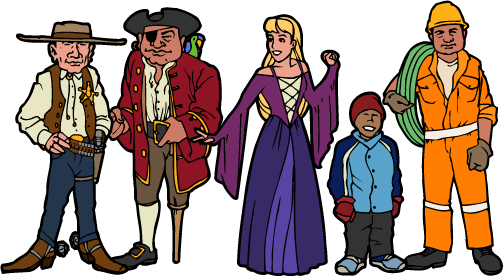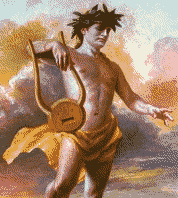Lesson 1.1C: Reading Fiction

Reading fiction, such as stories and novels, requires a different set of skills from reading non-fiction. While you might encounter new words in a story (don't forget to use context clues), as well as facts and opinions (don't forget how to identify those either), stories have other unique features, and it's important to understand what they are. Here is a list of some basic features of a story:
- plot: the structure of a story; the sequence of events that happens in a story
- characters: the fictional people an author creates in a story
- conflict: occurs when a protagonist is opposed by some person or force in a story
- climax: this is the decisive moment or turning point in the story
- setting: the time and place or the when and where of a story
This lesson will help you develop skills that are useful when reading fiction or stories. The goal of reading stories is more than just understanding the words on the page, but also making meaning for yourself based on what you have read.
Active Reading
The act of reading stories can be broken into three stages:
Stage |
Action |
Skill |
before you read |
Think about why you are reading and what you already know, and what you think the story might be about. |
predicting |
while you read |
Think about what you've learned so far and what will happen next in the story as you read.
What questions do you still have? |
predicting
questioning |
after you read |
Think about what you've read, making connections to yourself, the world around you, and whatever work or assignment you might now have to complete. |
reflecting
connection |
In a nutshell, this reading strategy is based on active reading, reading that requires you to think about the story and what's happening in it while you read. Reading in this way is far more effective than reading a story, wondering what really happened in it, and then having to read it again.
Remember, stories are not only meant to entertain us, but also to teach us.
How to read a story… Tips to Use
The following are some tips to consider when you approach a new reading to help set the stage for what the reading is about:
- Read the title first - the title can often be a clue to what might happen in a story, or what a story might be about.
- Look at the author's name - do you recognize the name? Have you read anything by this person before?
- Look for pictures or illustrations - these can give hints about a story.
- Read the first few paragraphs - this is where an author will tell you about characters, setting, possible conflicts, and plot.
- Enjoy reading the story - what are the characters like? Try to visualize the setting; make connections to your own life.

Let's have a look at how this works by reading "The Myth of Orpheus." |
The Myth of Orpheus
Orpheus was the great musician and poet of ancient Greek mythology. His songs could tame wild beasts and even make the rocks and trees move. Orpheus also helped heroes on their mythic quests. His wife, Eurydice, however, was killed by a serpent's deadly bite. Hades, god of the underworld, allowed Orpheus to bring Eurydice back to the land of the living on the condition that he not look back at her until they were in the mortal world once again. Just before reaching the surface, Orpheus looked back, and his wife was lost forever.
 Read "The Myth of Orpheus." When you have finished, look at the completed "Reading to Write Well" template to view how an active reading strategy works. Read "The Myth of Orpheus." When you have finished, look at the completed "Reading to Write Well" template to view how an active reading strategy works.
|
 Orpheus was named the greatest of all musicians. He sang and performed songs of all kinds: high-pitched songs about the mystical creation of the universe, sometimes songs on his lyre with low notes telling of the battles of Zeus and the Olympian gods who clashed against the Titans. Orpheus even sang magical songs about people who were changed into flowers or birds or trees. Orpheus was named the greatest of all musicians. He sang and performed songs of all kinds: high-pitched songs about the mystical creation of the universe, sometimes songs on his lyre with low notes telling of the battles of Zeus and the Olympian gods who clashed against the Titans. Orpheus even sang magical songs about people who were changed into flowers or birds or trees.
Whichever song he sang, the rich clear words and the silvery notes from his harp were so enchanting that they always had a magical effect on everything around him. His songs could charm even rocks and rivers as well as humans and animals.
When Jason, a great adventurer, was ready to search for the Golden Fleece, Orpheus was invited to go along. Orpheus was great help on the long journey. When the tempers flared among those on the ship, Orpheus would sing a soft song and calm those who had been arguing. Other times, when the rowing was long and tedious, Orpheus would begin to play his lyre. Time would seem to float by and the rowers would not feel tired as they listened to these beautiful melodies.
After returning from the voyage, Orpheus fell in love with the beautiful Eurydice. They were married and had a great feast. On their wedding day, Eurydice was walking through a field and talking happily with her friends, when she stumbled upon a poisonous snake. The serpent bit her and she died.
Orpheus was heartbroken. He had been married and widowed on the same day. After weeping for several weeks, he decided that he would go to Hades, the land of the dead, and plead for his wife's return.
Orpheus was not frightened as he played his music and crossed the river into Hades. As he played his music about his lost wife, the creatures of the underworld began to weep. When Orpheus approached Pluto, the god of the underworld, the musician sang his sad and sweet song, pleading to have his bride back. Pluto, moved by the song, agreed. Eurydice was called and she came, still limping from the wound where the snake had bitten her. Pluto agreed that Orpheus could have his wife back, but only on the condition that he did not look back at her until he had reached the land of the living again.
Orpheus began walking up the long steep path that led to the sunlit world of men. The path was gloomy and quiet. All he could hear was the soft pad of Eurydice's bare feet upon the rocky steps. At last Orpheus saw sunlight coming through the opening to the world of the living. But he forgot himself, and turned to look at his wife. There stood Eurydice, as lovely as a spring morning, and then she began to fade away. He desperately tried to embrace her but she only had time to whisper "farewell" before she vanished.
Orpheus tried to cross into Hades again, but he was not allowed to this time. He sadly returned home. Orpheus spent the rest of his life on a hill, singing songs that enchanted the beasts and the trees of the forest.
It is said that when Orpheus finally died, the birds wept and the trees shed their leaves. Orpheus' spirit went down to Hades and he soon found Eurydice. Although living a life of shadows, the two walk together now without fear of being separated. |
Look at the following table to see how this reading strategy works. You can complete this kind of template when you read a new story or even ask these questions aloud to yourself or silently in your head. Regardless of how you use the strategy, you will be reading with an active mind!
| Pre-reading |
| Knowledge: This is a myth, so it must be an old story; the name Orpheus is unfamiliar to me. |
Predict: Something must happen to Orpheus, he sounds like the main character if his name is in the title. |
Questions: Who is Orpheus? What will happen to him? |
| Reading |
| Learning: The other names sound old too; I think this is a Greek myth; there are also lots of exaggerated parts to the story so far, which is all part of this kind of story. |
Predict: Orpheus is brave and his music is very beautiful, so this will be important later in the story; myths sometimes have bad or tragic endings, so something will happen to Orpheus, because Jason is out of the story by the end of paragraph 3. |
Questions: What is going to happen to Orpheus? How will music be important in the story? |
| Post-reading |
| Connections: Love must be powerful if someone is willing to do that for the person he loves; would I be that brave? |
Connections: Not quite sure what the larger connection is, maybe something about the power of love, or the bond two people can have, or the importance of listening. |
Connections: Even though this story is very old, the power of love is something that seems to be timeless in a number of stories. |
Summary
Completing this lesson has helped you to:
- understand the basic features of a story
- use your prior knowledge when reading a story
- make predictions and inferences when reading a story
- list questions you have while reading a story (and answers you discover along the way)
- make connections to yourself and the world around you based on what you've read (reflection)
- organize and separate your reading into chunks to make reading fiction more manageable
|

